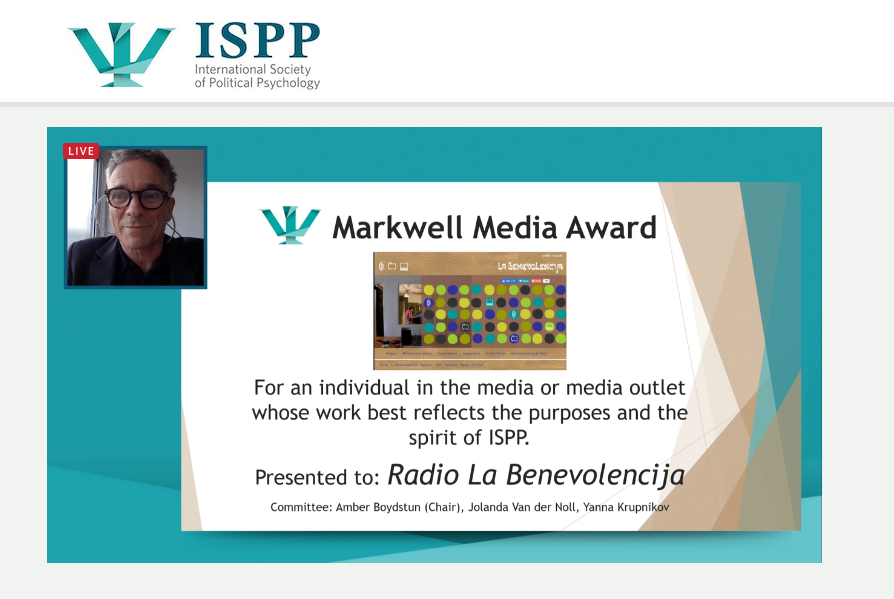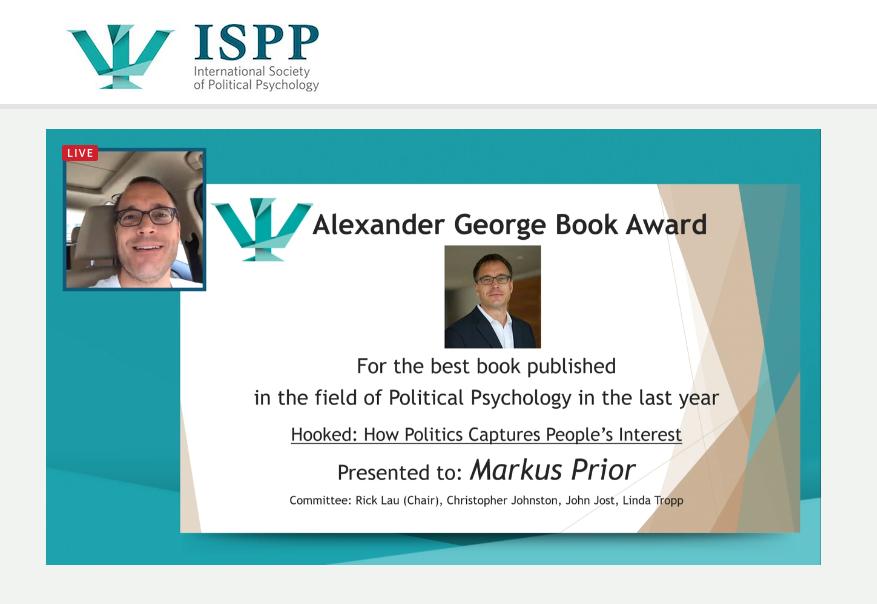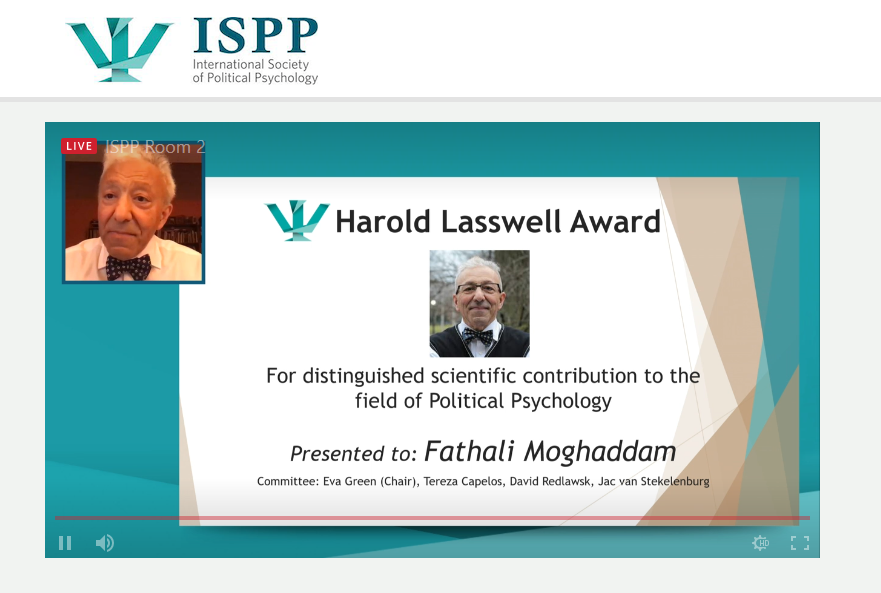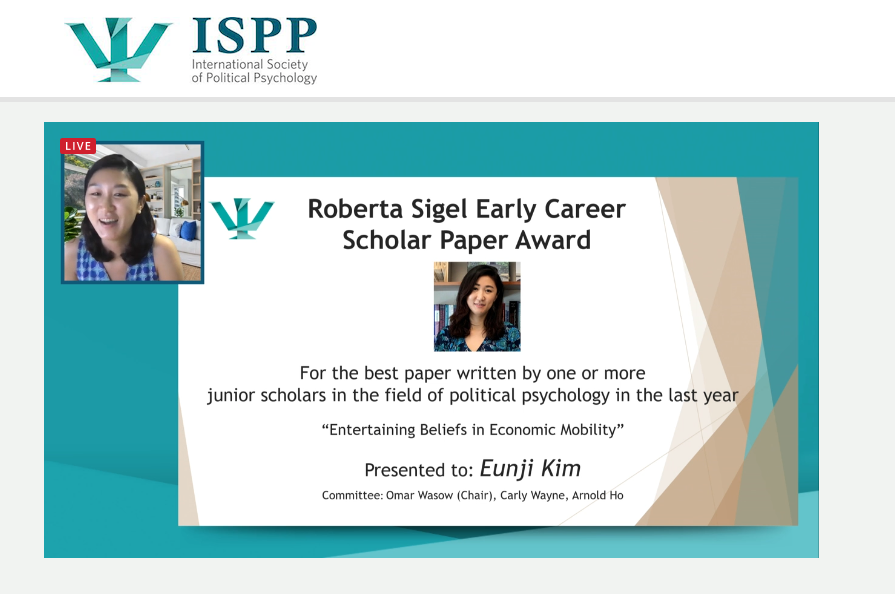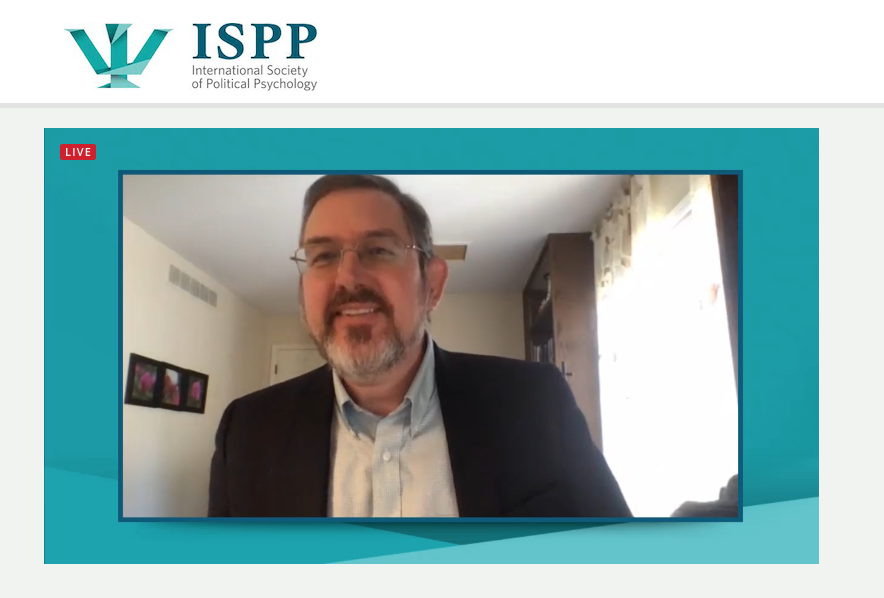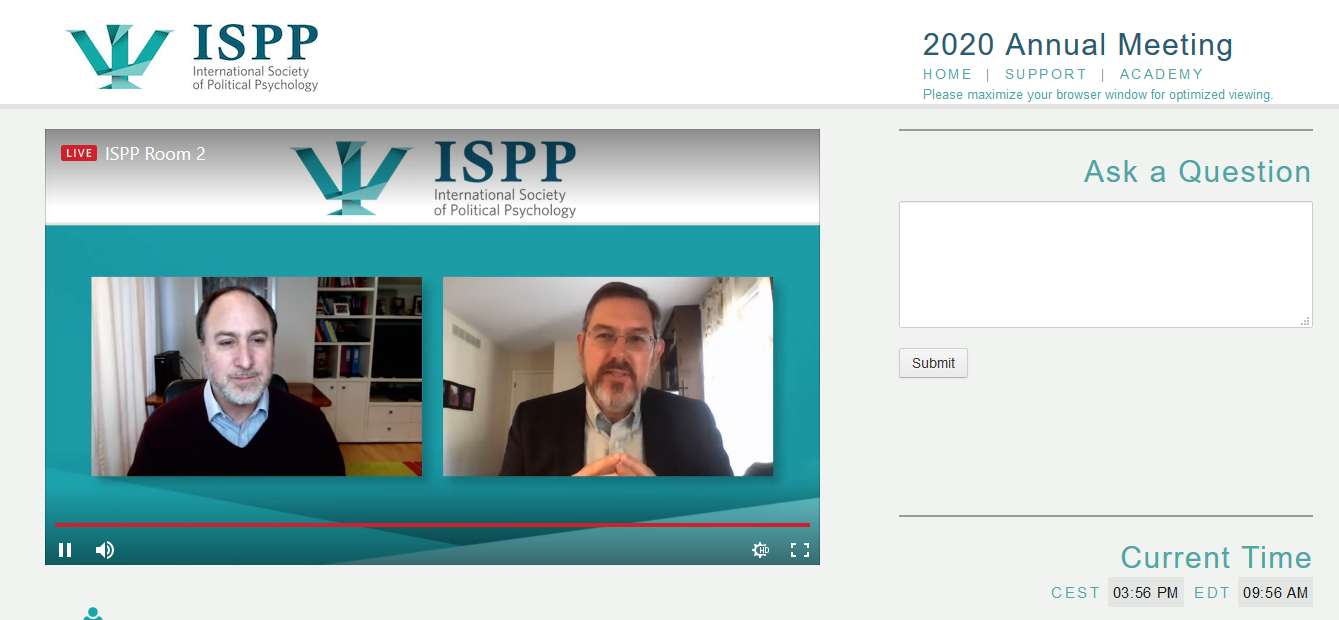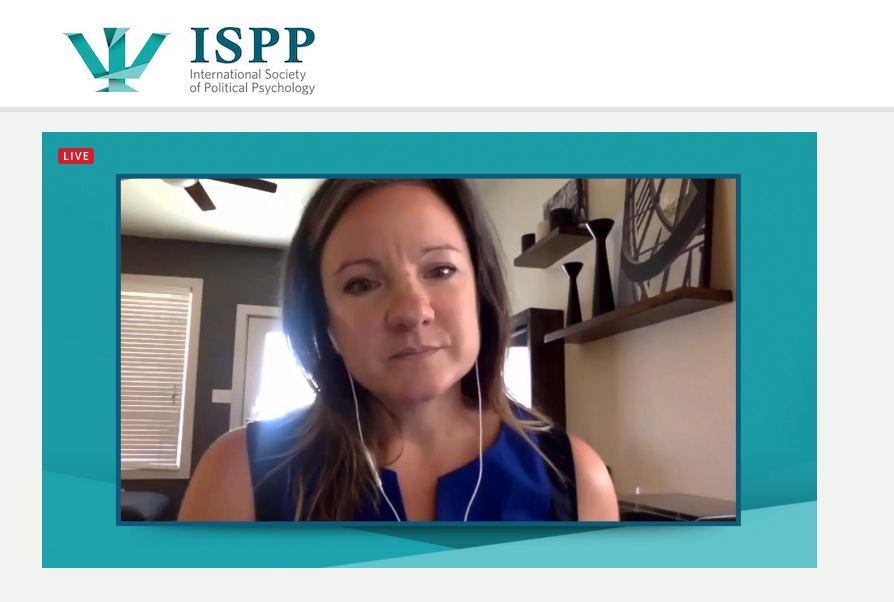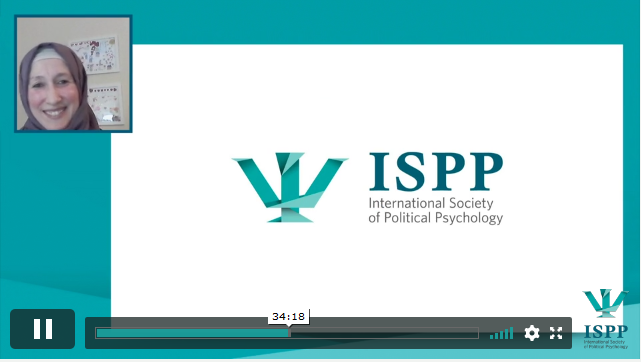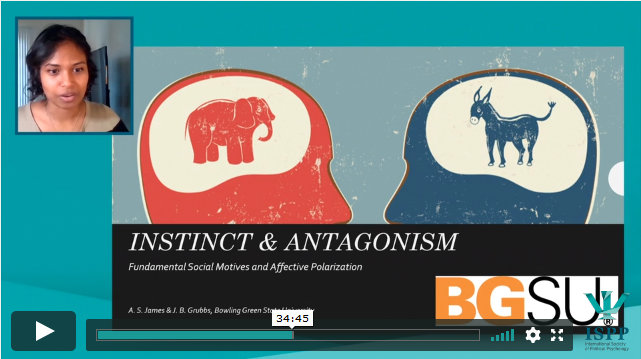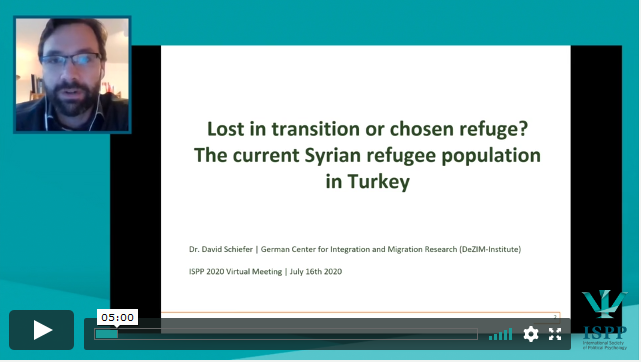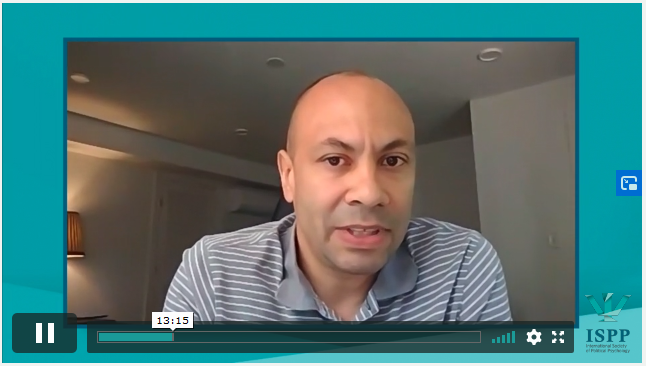President: Nicholas Valentino
Conference Chairs: Lilliana H. Mason (University of Maryland, USA) and Thomas Craemer (University of Connecticut, USA)
2020 Online/Virtual
Conference Program (PDF)
ISPP’s 43rd Annual Meeting made history by being ISPP’s first fully virtual meeting. Originally planned to take place in Berlin, Germany, ISPP’s leadership made the decision to shift to an all-virtual event in response to the challenges presented by the global COVID-19 pandemic. Shifting to an all-virtual format with a global audience required a substantial revision of the original section chairs’ selections and a notable difference in conference attendance and attendees. This made for a challenging but dynamic programming environment.
Despite the challenges, the conference succeeded in showcasing the important and cutting-edge scholarship being conducted by our members, and encouraged future collaboration. The program brought together more than 594 registered delegates from a wide range of countries, disciplines, and career stages participating in 126 total sessions. The theme of “Polarization, Misinformation, and Entrenched Group Conflict: Harnessing Political Psychology to Find Solutions to Problems New and Old” took on new meanings in light of the pandemic and uprisings in response to racial tension and police brutality in response to the killing of George Floyd in Minneapolis, and the typical Presidential Address was changed to a Presidential Symposium on Race and Emotion in the Current Moment: Can Anger Bind a Diverse Social Movement? featuring four Black scholars (Antoine Banks, Davin Phoenix, LaFleur Stephens, and Ismail White). The 2020 program recognized society’s challenging times, but also encouraged us to think about how political psychology can contribute to positive trends in favor of liberal democracy, academic freedom, and even understanding the global pandemic.
Thanks to all who participated — together we developed one of the most memorable ISPP conferences in history — and not just because it was the first one presented fully online. Response was overwhelmingly positive, and we hope that the experiences gathered during the meeting will help us as an association to grow more inclusive of scholars that have difficulties participating in-person at our typical meeting locations, or that are cut off from participating due to their governments’ illiberal policies. Having a professionally hosted online event this year was one way to overcome these obstacles, while at the same time reducing ISPP’s overall carbon footprint.
2020 Award Winners

Harold Lasswell Award for Outstanding Scientific Accomplishment in Political Psychology
Fathali Moghaddam, Georgetown University
Dr. Fathali Moghaddam is a pioneer in political psychology and has made extraordinary contributions in both applied and research domains internationally over the last 40 years. He has notably contributed to a deeper understanding of the psychology of dictatorship and democracy, as well as the process of mutual radicalization, which results in spirals of intergroup conflict. Moving away from individualistic approaches in political psychology, he has argued and demonstrated how the societal context shapes psychological processes and individual behavior, such as terrorism. Throughout his career, Fathali has been a firm and vocal advocate for moving beyond western perspectives of political psychology, and psychological science in general, and pushing for the development of psychology that better meets the needs of low-income societies. As editor of Peace and Conflict: Journal of Peace Psychology he has contributed in shaping this sub-field of political psychology. Since 9/11 he has actively participated in efforts to correct APA policy on torture. These distinguished contributions to the field of political psychology lead the committee to recommend Dr. Moghaddam for the 2020 Lasswell Award.

Nevitt Sanford Award for Outstanding Professional Contributions to Political Psychology
Orla Muldoon, University of Limerick
Dr. Orla Muldoon has made prolific research contributions in political psychology over the last 25 years with a focus on the power of groups through social identity, as well as social identity processes underlying well-being and trauma in contexts of adversity. In the spirit of Nevitt Sanford, Orla is strongly committed to making academic knowledge work in the solution of social problems internationally and locally by informing politics, policy and practice. In Ireland, Orla Muldoon has raised awareness of health risks, stimulated public debate and improved understanding amongst communities affected everyday by adversity and inequality on topics ranging from suicide prevention, reproductive rights, chronic disability, children’s rights to meet incarcerated parents, to political violence relating to the legacy of The Troubles. Internationally, her research has informed policy on supporting victims of terrorism. Orla has also used her knowledge of political psychology in Nepal to encourage activism that resulted in rebuilding a school after an earthquake and by tackling the stigma related to leprosy in local communities. The breadth and international extent of these professional contributions to the field of political psychology lead the committee to recommend Dr. Muldoon for the 2020 Sanford Award.

Jeanne Knutson Outstanding Service to ISPP Award
Catarina Kinnvall, Lund University
Dr. Catarina Kinnvall is a highly active and influential ISPP member since 1996 with an outstanding track-record of ISPP service. She has served on the Governing Council of the society and as Vice President, and on a number of committees over the years. In 2004, she was program chair of the ISPP annual meeting hosted in her hometown, Lund. Catarina was Editor-in-Chief of Political Psychology until January 2020, and under her five-year editorship the journal made significant progress in raising its international profile and impact factor, while promoting the discipline of political psychology across the globe. She has participated in mentoring early career scholars on how to successfully navigate the world of research dissemination. Catarina has also promoted political psychology outside the society, notably by co-editing the Palgrave Studies in Political Psychology series. We can only conclude that Catarina Kinnvall is a unique example of female leadership! She was the unanimous choice of the selection committee for the 2020 Knutson Award.


David O. Sears Best Book on Mass Politics Award
S. Erdem Aytaç & Susan Stokes for Why Bother: Rethinking Participation in Elections and Protests
This year’s Sears award winnter fits all of the criteria to a “T”: Erdem Aytac and Susan Stokes' book Why Bother: Rethinking Participation in Elections and Protests (Cambridge University Press).
This is a very theoretically ambitious book which addresses the so-called “turnout paradox” that has been with us for as long as social scientists have been gathering election data: Why should anyone Bother to participate in politics, if you have no realistic chance to affect the outcome of an election? Their theory of “costly abstention” goes a long way toward providing an intuitively satisfying answer to the paradox. They apply their theory to both the “easiest” type of political participation – voting – and to some of the most difficult and costly – protesting. They bring survey data from the U.S. and several European countries to bear on their findings – a plus, again, for an award given out by ISPP.
As with the Markus book, what the committee particularly liked about Why Bother is that it offers broad theoretical insights relevant to political psychology, in ways that can be generalized to many other contexts.

Alexander George Book Award
Markus Prior for Hooked: How Politics Captures People’s Interest
This year’s winner is Markus Prior's book Hooked: How Politics Captures People’s Interest (Cambridge University Press), which clearly fills all of the criteria described for this award.
Political interest is one of the most important concepts in the study of political behavior. It is certainly what brought all of us to this organization and to this convention, but before Hooked, we have never had a comprehensive study of what political interest means, how it develops, and why it matters for democratic government. It is a truly momentous empirical accomplishment that brings multiple datasets and many years of observations to bear on all of his research questions. One very surprising conclusion from the book is that political interest, rather than being event driven, is essentially genetic (or at least learned very early in life). Almost all political junkies get hooked early, and stay hooked throughout life.
What the committee particularly liked about this book is that it offers broad theoretical insights relevant to political psychology, in ways that may be generalized to other contexts. It includes data from four western democracies, a particularly nice feature for an international organization such as ISPP.

Jim Sidanius Early Career Award
Joshua David Kertzer, Harvard University
The pool of nominees we considered this year included several exceptionally impressive scholars. Even in such notable company, this year’s nominee – Josh Kertzer, stood out and represented our unanimous choice. He is a once-in-a-generation scholar, and we are delighted to be able to honor him and his work.
To state my bottom line up front, Josh is an unusually gifted scholar by any standards. His work and grasp of the literature is cutting edge and he is clearly a star. The simple metrics of Josh’s work make a compelling case. His book, Resolve in International Politics, was published by Princeton University Press and received ISPP’s Alexander George Award. It is a major contribution to the literature in both IR and political psychology, combining rich theory, creative argument, and sophisticated quantitative methods at multiple levels of analysis to address an issue of contemporary concern. One description called it a “tour de force” and “simply brilliant, producing a major innovation in the conceptual issue of resolve,” which had attracted a great deal of attention but little progress prior to Josh’s efforts. This award winning book built on the four national and international awards the dissertation version of this research received. More generally, he publishes regularly in top IR and general political science journals, with a total of 19 peer-reviewed articles already.
Josh’s work is impressive for a host of reasons, but this award is especially appropriate because he has brought the insights and concerns of political psychology to the attention of his entire subfield. As his nomination letter writers put it, “He is at the forefront of a renaissance in the application of psychological insights to international relations.”
Even with all this impressive research productivity, Josh also takes time to serve the discipline, reading and commenting thoughtfully on the work of others, reviewing regularly, and organizing helpful panels and other opportunities at major conferences and other venues. We expect he will be a leading voice in both IR and political psychology for many years to come, and we cannot wait to see the excellent work and collaborative projects he produces next.

Best Dissertation Award
Carly N. Wayne, Washington University St. Louis
Combining political psychology with formal modeling, Carly Wayne’s dissertation examines why terrorist groups often challenge opponents that are much stronger, and why those stronger opponents so often get drawn into conflicts that do not warrant the attention. Building on what she calls the strategic psychology of terrorism, Wayne runs a series of experiments demonstrating that the dominant response to terrorism is not actually terror at all, but anger and moral outrage. These feelings lead citizens to demand retribution, which increases politicians’ likelihood of taking military action, even if that may not be the best strategic option. Ironically, engaging these weaker actors, who cannot compete militarily, can actually increase the likelihood of future terrorism by the group.
The three members of the dissertation award committee agree that Carly Wayne’s work constitutes an extraordinarily creative synthesis of literatures and methods. She identifies a clear and important puzzle, provides novel and surprising insights, and communicates her theory and evidence eloquently. In short, this dissertation is a model of good scholarship, and it should be widely read. We want to emphasize that the pool of nominees was extremely strong this year, and we mean that very sincerely. We enjoyed reading the many fine dissertations that were submitted. Nonetheless, Carly Wayne’s work stood out from the rest. Please join me in congratulating Carly Wayne on her remarkable dissertation.

Roberta Sigel Best Conference Paper by Early Career Member Award 1
Eunji Kim, Vanderbilt University
We recommend Eunji Kim's “Entertaining Beliefs in Economic Mobility” for a handful of reasons:
- a substantively interesting and important question: why doesn't rising inequality correspond to greater public concern about inequality?
- a well-developed theory that applies both to the particular puzzle of the paper and could clearly be applicable in other contexts
- an impressive and careful multi-method approach, including three national surveys and multiple experiments (both online as well as a lab-in-the-field)
- and, more generally, the paper pushes political science to engage more deeply with the implicit political content of popular media and to broaden beyond studies of media that focus almost exclusively on effects of news
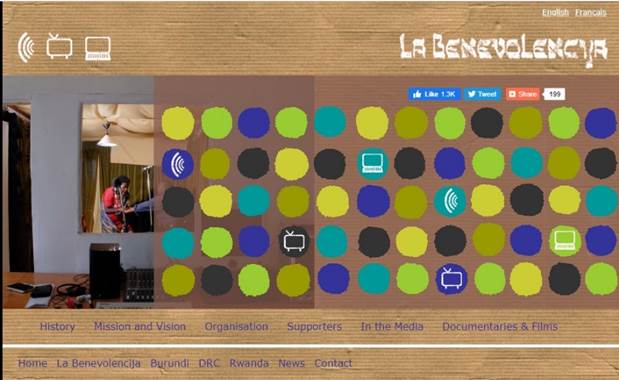
Noel Markwell Media Award
Radio La Benevolencija, The Netherlands
The Noel Markwell Media Award is presented to someone in the media whose work best reflects the purposes and the spirit of the International Society of Political Psychology, specifically to an institution, journalist, or other media source that demonstrates concern for political psychology factors. This year's Markwell Media Award goes to the Radio La Benevolencija Humanitarian Tools Foundation. For more than 15 years, Radio La Benevolencija has produced and broadcasted radio dramas built directly on the political psychology literature. The aim of these radio dramas is to facilitate reconciliation in conflict-ridden societies in Rwanda, Burundi, the Democratic Republic of Congo, and other societies worldwide. The organization does this by embedding the radio dramas with cues drawn from political psychology to promote active bystandership for peace building and positive social change. The radio drama campaigns are regularly evaluated and have been shown to positively influence peace building and reconciliation. In addition to having a positive impact on the world, the radio dramas have provided an ongoing field experiment, helping scholars and practitioners alike understand effective methods that can be used to stimulate national audiences to resist incitement to violence -- not only in Africa, but also in Europe, the U.S., and anywhere around the globe. This project has also led to several scholarly articles published in a range of political psychology journals. In short, Radio La Benevolencija paves the way for understanding how using fiction, embedded with political psychology-motivated messaging, can combat very real political prejudice and violence.
Best Poster Awards: The winners of the first ISPP Best Poster Awards were drawn from a pool of 18 original nominees. In a first stage, we selected five finalists, and the two winners were chosen from these finalists in a second stage. Though the field was strong, ultimately our two winners emerged as the most consistently top-ranked submissions across judges in both stages.


Best Poster Award 1 (from the 2019 ISPP Annual Meeting): Adrian Rothers & J. Christopher Cohrs, Philipps University Marburg, for "What Makes People Feel Respected in Political Disagreements"
The first award for Best Poster for a poster presented at the 2019 meeting goes to Adrian Rothers & J. Christopher Cohrs, for the poster "What Makes People Feel Respected in Political Disagreements?"
Rothers is a PhD student and Research Fellow in the Department of Psychology at Philipps University Marburg in Germany, and Cohrs is Professor of Social Psychology in the Department of Psychology at Philipps University Marburg. Their research focuses broadly on the social psychology of intergroup relations and intergroup attitudes, with particular interests in the nature of political disagreement.
In two studies – one relying on both content analysis of free responses and the other using survey methods – Rothers and Cohrs examine the antecedents of perceived respect in the context of controversy-laden political discussions. They find that “in political arguments, people feel respected not only when they see their status and belonging, but also their autonomy and justice concerns addressed.” Their findings add to the literature on respect in political discourse by emphasizing that perceived respect is not just a matter of feeing like one’s status and inclusion are recognized, but also matter of feeling that one is treated fairly and as an autonomous being.

Best Poster Award 2 (from the 2019 ISPP Annual Meeting): Kangkyu Lee, Yenching Academy at Peking University, for "Recentralizing the Implicit Link Between Confucianism and Chinese Policy: Beliefs and Public Attitudes towards the Chinese Social Credit System as a Case Study"
The second award for Best Poster for a poster presented at the 2019 meeting goes to Kangkyu (David) Lee, for the poster "Recentralizing the Implicit Link Between Confucianism and Chinese Policy: Beliefs and Public Attitudes towards the Chinese Social Credit System as a Case Study."
Lee is currently a Korea Foundation Fellow at Pacific Forum and research assistant for the Berggruen Institute China Center in Beijing, China. His research centers “on the intersection of political psychology, behavioral economics, and comparative politics,” with a particular focus on public opinion China, Japan, and South Korea.
Using both survey data and text analysis, Lee examines the antecedents of support for China’s ‘social credit system,’ and finds that four of the five Constant Virtues of Confucianism predict support for various aspects of the social credit system. Hs findings reinforce the growing centrality of Confucian rhetoric in the legitimation of current policy in China.
Event Photos
Keynote Speeches
2020 Keynotes: Below are recordings for each of the four keynote presentations at ISPP’s 2020 Virtual Meeting.
Presidential Symposium on Race and Emotion in the Current Moment: Can Anger Bind a Diverse Social Movement?
Nicholas Valentino (University of Michigan, USA), Antoine Banks (University of Maryland), Davin Phoenix (University of California-Irvine), LaFleur Stephens (Princeton University), Ismail White (Duke University)
Ambivalence about Social Relevance: Reframing Academic Research and Reaffirming Our Commitment to the Public Good
Linda Tropp (University of Massachusetts Amherst, USA)
Collective Action as a Vehicle for Social Change: The Psychological and Political antecedents and consequences of the Social Outbreak in Chile
Roberto González (P. Universidad Católica de Chile, Chile)
What we can see and what we do not: The different roles of emotion in the rise of the far right
George Marcus (Williams College, USA)

